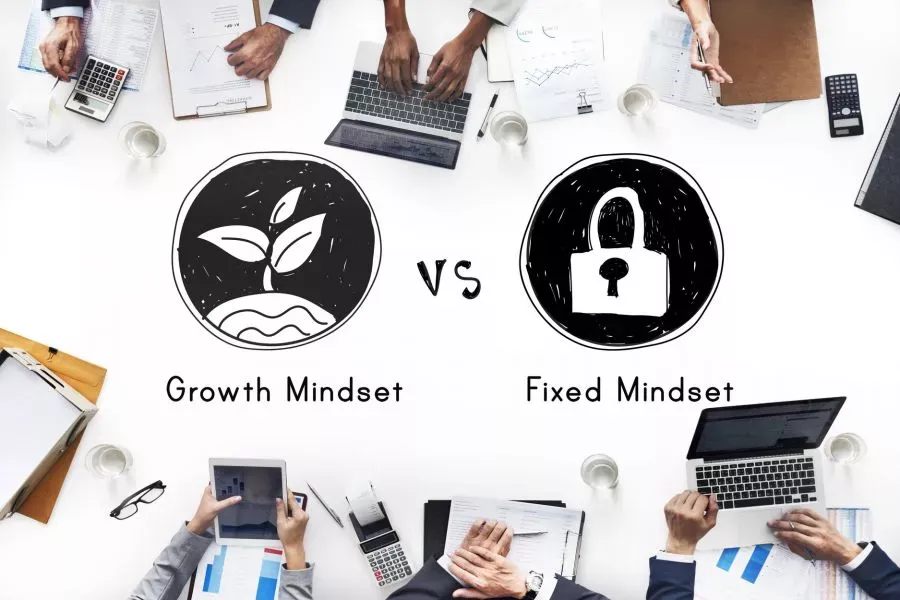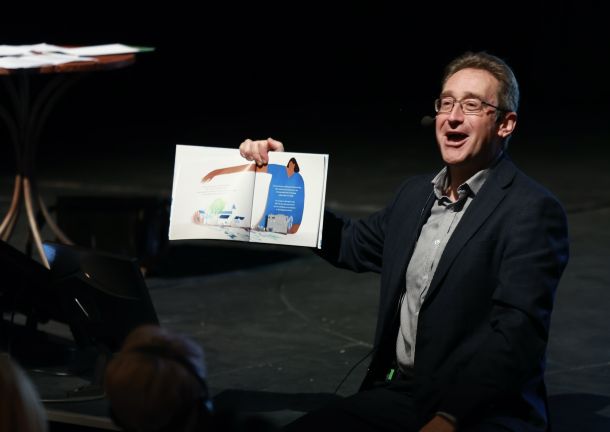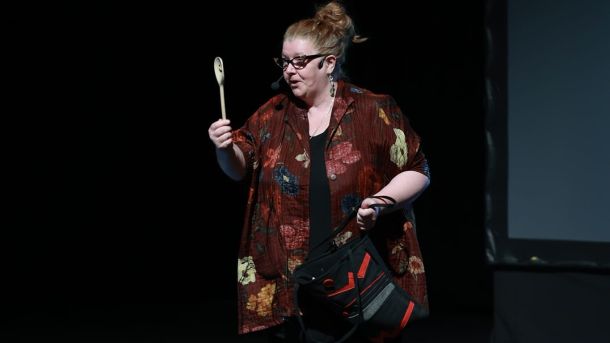
Why having a growth mindset is important for learning
Having a growth mindset is important for learning because it helps you find solutions, be more optimistic, and always remain constantly eager to learn.
Happiness is still an enigma for many people. How do we get to a state of happiness, how do we maintain it and what is the correlation between the mindset that we use the ability to be happy? Studies of several middle and high school students have shown that there is a direct link between mindset - growth mindset or rigid mindset - and the ability to stay engaged in a difficult task and, by extension, the ability to achieve and maintain happiness.
Happiness means endless curiosity, constant learning, and juggling new and difficult situations. Often what we do to motivate our children diminishes their desire to learn. What children and adults need is to remain constantly eager to learn. There are two kinds of mindsets - the rigid mindset, which says that intelligence is inflexible, and the growth mindset, which says that intelligence is constantly developing. Children and adults have different mindsets about their talents and abilities. With a rigid mindset, children believe that their talents, skills, and abilities are limited and cannot be improved. This mindset sabotages children's motivation to learn and adults' motivation to take responsibility. Children with a growth mindset, on the other hand, believe that their skills can be continually improved through practice, dedication, and mentoring help. They believe that we can all get smarter, as long as we work on getting smarter. These people stay committed to the learning process for the long haul. In stressful situations, some people stay engaged in learning, and therefore evolve and are happy, others do not.
Situations in which the growth mindset type yields positive results
In the United States, studies were conducted on a representative sample of several hundred seventh graders during a period when they were undergoing several school changes, from grading to subject difficulty and assessment methods. Although at the beginning of the seventh grade they had comparable results, over two years it was observed that those with a flexible mentality achieved much better results, while in the case of children with a rigid mentality, a stagnation and then a decline in school performance was observed. Another study of students preparing for medical school exams and subjected to a highly demanding curriculum and tough exams found that those with a growth mindset were more focused on learning than on marking and remained engaged in the process, even if it required a lot of effort or did not get the desired results immediately. Those with a rigid mindset, even if they had the knowledge and intelligence, failed to stay engaged in the learning process all the way through, and the results were not the best. A study that monitored students' brains while they worked on a project showed that those with a growth mindset made mistakes, processed them, and corrected them along the way. They remained curious and eager to complete the project. On the other hand, students with a rigid mindset could not process mistakes but tried to avoid them as much as possible.
How is a growth mindset formed?
Research on children of different ages shows that the first decisive factor in the formation of a flexible or rigid mindset is praise.
In the case of those who are praised for their abilities - You're very clever - the mindset that is formed is a rigid one. Helping to build a growth mindset requires a focus on process, strategy, and effort - You worked hard! The focus on skills makes children happy in the short term, but when difficulties arise, the effect wears off and the brain forms a rigid mindset. When the task becomes difficult, children become demotivated and ineffective at solving the problem. When the focus is on the process, children are taught to persevere and focus on solving problems. In the case of 0-3-year-olds, mothers' process-focused praise has led to the development of a winner mentality, focused on growth and development. These results are only visible within 5 years, but the process starts very early.
Can the mentality be changed?
To find out if there is an age limit to changing the mindset - flexible or rigid - a study group was set up of seventh-graders who were doing poorly in maths. The children were divided into two. One group received intensive six-session training in learning skills, while the others were given additional sessions based on the growth mindset, in which the children learned that intelligence can develop and the brain behaves like a muscle that needs work. These pupils learned about the new connections that form in the brain when they learn something new and when they put in the extra effort. In a rigid mindset, students believe that the difficulties that arise in learning are due to their inability or lack of knowledge. In a growth mindset, however, they know that the challenges that arise develop their intelligence. In the experiment, those who received the growth mindset training performed increasingly well, while the rest continued to perform poorly.
A growth mindset is not only beneficial in learning
The results can also be seen in personal relationships in different environments. Research on teenage bullying in high schools has shown that mindsets can be changed at any time, even in cases of violence or deviant behaviour. Several ninth-graders were divided into three groups. Two of the groups attended conflict resolution and social skills development workshops for three weeks. The third group was additionally taught flexible thinking concepts about brain anatomy and neuro-plasticity, motivation, and personality change. The children learned that people act on their fears and problems and that change is possible at any time. They also put what they learned into practice, individually and in groups. After a month, when the results were measured, the children were exposed to team games that proved the change in mentality in line with what they had learned. Those who had applied the growth mindset techniques showed team spirit, empathy, and care for others. Three months after the end of the experiment, the students trained in flexible thinking became much less aggressive and had fewer absences and fewer warnings. It was clear that the training had made them happier, and their school results were also better, although this was not the purpose of the experiment.
It turns out that a growth mindset also works in group conflicts
The initiators of the growth mindset project tested the concept in one of the world's most notoriously difficult areas, the Middle East, in the conflict between Palestine and Israel. The researchers measured the mindsets of those interviewed about the opposing side. Those with a rigid mindset believed that a group cannot change its main characteristics and that there is no compromise in political conflict, while those with a growth mindset believed that change is possible. The latter were more open-minded and willing to compromise. Both groups were given information about the pattern of group violence and the changes that can be made to the mindset. They were given examples of groups that had changed, either through the action of leaders or through changed circumstances. Once exposed to this information, those in the group with a rigid mentality saw a change in attitude towards their opponents, although they were not mentioned in the examples given, the discussion and examples were general, referring to groups of people. There was even a willingness of groups to meet and negotiate.
So the flexible type of mentality can be developed and intervention can be made at any time. The ultimate benefit is individual and collective well-being. The main ideas about the growth mindset and its link to progress in learning and happiness were taken from a talk by Carol Dweck, a motivational researcher, and professor of psychology at Stanford University in the United States, and were presented in the available presentation here.
How technology helps you cultivate a growth mindset and provide a healthy role model for students and for your own children
A growth mindset gives you a lifelong advantage because it is synonymous with professional and career development. As teachers and parents, we are the ones to provide our children with a model of continuous growth. One of the areas where our example can have an impact is the very relationship with technology. The way we use digital should be balanced, pragmatic, free from pathos, fear and anxiety.
At Kinderpedia, we've built a comprehensive and intuitive digital tool that helps teachers save between 6 and 9 hours a week of their administrative time. We allow them to channel their efforts where they matter most - towards the particular needs of each child. We help schools and kindergartens work smart and communicate efficiently with families. We support them in creating a dynamic and connected classroom, and automating financial activity.
Interested to discover how Kinderpedia can help your school or kindergarten? Schedule a demo for your team with one of our specialists.

Kinderpedia
The complete communication and management solution for schools and childcare centres.
Simplifies teachers' work and brings parents closer to their children's school progress.
Recommended articles
Want to improve your center quality? Kinderpedia is here to help! Not only do we provide thousands of informational content pieces like blog posts, podcasts, webinars and more, we are also makers of the #1 Rated and Reviewed Childcare Software.







